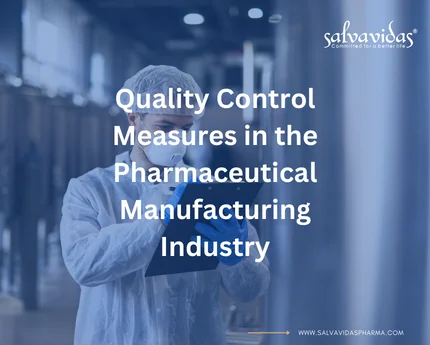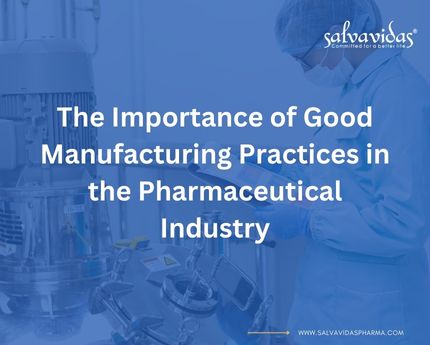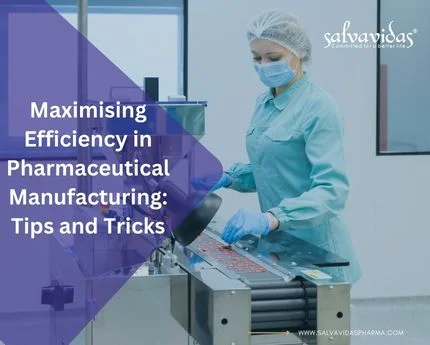
Introduction: Quality control is a crucial aspect of the pharmaceutical manufacturing industry. The production of safe and effective drugs depends on strict adherence to quality control measures at every stage of the manufacturing process. These measures ensure that the drugs meet the required standards of quality and efficacy and are free from contaminants and other harmful substances. Quality Control Measures in the Pharmaceutical Industry: The pharmaceutical industry implements a wide range of quality control measures to maintain the safety and efficacy of its products. Some of the most critical quality control measures are: Raw Material Testing: Before the raw materials are used in the manufacturing process, they undergo a series of tests to ensure their quality. This includes tests for the purity, identity, and potency of the raw materials. Process Control: The manufacturing process itself is carefully monitored and controlled to ensure that the final product meets the required standards. This includes checks on the equipment used, the temperature, and the conditions under which the process takes place. Finished Product Testing: Once the final product has been manufactured, it undergoes a series of tests to ensure its quality. This includes tests for the potency, purity, and stability of the drug. Stability Studies: Stability studies are conducted to determine the shelf life of a drug and its stability under various storage conditions. This helps to ensure that the drug remains effective and safe even after long periods of storage. Validation: Validation is the process of ensuring that the manufacturing process, equipment, and facilities are capable of producing products that meet the required standards of quality. This includes conducting process validation, equipment validation, and cleaning validation. Documentation: Accurate and comprehensive documentation is critical in the pharmaceutical industry. It helps to ensure that the quality control measures are properly implemented and that the products meet the required standards. FAQs: Q. What is the purpose of quality control measures in the pharmaceutical industry? A. The purpose of quality control measures in the pharmaceutical industry is to ensure the safety and efficacy of the drugs being manufactured. These measures help to ensure that the drugs meet the required standards of quality and are free from contaminants and other harmful substances. Q. What are the most critical quality control measures in the pharmaceutical industry? A. The most critical quality control measures in the pharmaceutical industry include raw material testing, process control, finished product testing, stability studies, validation, and documentation. Q. How does the pharmaceutical industry ensure the quality of its products? A. The pharmaceutical industry ensures the quality of its products by implementing a range of quality control measures at every stage of the manufacturing process. These measures include tests for raw materials, process control, finished product testing, stability studies, validation, and documentation. Conclusion: Quality control measures are critical in the pharmaceutical manufacturing industry. They ensure the safety and efficacy of the drugs being produced and help to maintain the integrity of the pharmaceutical industry. By implementing strict quality control measures, the pharmaceutical industry can ensure that its products meet the required standards and are safe for use by the public. The “Quality Control Measures in the Pharmaceutical Manufacturing Industry” play a vital role in ensuring that the drugs produced are of the highest quality and are free from contaminants and other harmful substances. Contact Us: Name: salvavidas pharmaceutical pvt. ltd Email: info@salvavidaspharma.com Phone No: +91 98983 21242 Address: Corp. Office #803, Shubh Square, Near Lal Darwaja, Surat, Gujarat 395004, India

The Importance of Good Manufacturing Practices in the Pharmaceutical Industry Good Manufacturing Practices (GMP) is a set of guidelines that ensure the safety, quality, and efficacy of pharmaceutical products. GMP regulations apply to all aspects of drug manufacturing, including raw materials, equipment, personnel, and facilities. In the pharmaceutical industry, adherence to GMP is essential for maintaining the safety and effectiveness of drugs. In this article, we will discuss the importance of GMP in the pharmaceutical industry and how it can impact the quality of drugs. Introduction to Good Manufacturing Practices Good Manufacturing Practices are a set of guidelines that ensure that the drugs manufactured by pharmaceutical companies are of high quality and safe for use by patients. GMP guidelines cover all aspects of the manufacturing process, including raw materials, equipment, facilities, and personnel. These guidelines are put in place to ensure that the drugs produced meet the required standards and specifications. The Importance of GMP in the Pharmaceutical Industry The importance of GMP in the pharmaceutical industry cannot be overstated. The primary goal of GMP is to ensure that drugs are of high quality and safe for use. Without GMP regulations, there would be no way to guarantee the safety and efficacy of pharmaceutical products. Pharmaceutical companies must adhere to GMP guidelines to ensure that their products are safe and effective. How GMP Guidelines Impact the Quality of Drugs Adherence to GMP guidelines ensures the quality of drugs in several ways. For example, GMP guidelines ensure that the raw materials used in drug manufacturing are of high quality and that the manufacturing process is standardized. This helps to minimize variations in drug quality and ensures that drugs are consistent in terms of strength, purity, and quality. GMP guidelines also require that drug manufacturers maintain clean facilities and equipment to prevent contamination. This is critical in ensuring the safety of the drugs produced. GMP guidelines also require that pharmaceutical companies employ trained and qualified personnel to handle drug manufacturing. This helps to minimize the risk of human error and ensure that the drugs are manufactured to the required standards. The Impact of Non-Compliance with GMP Guidelines Non-compliance with GMP guidelines can have severe consequences for pharmaceutical companies. If a drug manufacturer fails to adhere to GMP guidelines, the quality and safety of the drugs produced may be compromised. This can result in the withdrawal of the drug from the market, loss of reputation, and legal action. In extreme cases, non-compliance with GMP guidelines can even result in harm to patients. The Future of GMP in the Pharmaceutical Industry GMP guidelines are constantly evolving to keep pace with changes in technology and the pharmaceutical industry. As new drugs and manufacturing processes are developed, GMP guidelines must be updated to ensure their safety and efficacy. In the future, we can expect GMP guidelines to continue to evolve to meet the changing needs of the pharmaceutical industry. FAQs Q: What are GMP guidelines? A: GMP guidelines are a set of regulations that ensure the safety, quality, and efficacy of pharmaceutical products. Q: Why are GMP guidelines important? A: GMP guidelines are important because they ensure that drugs are of high quality and safe for use by patients. Q: What impact do GMP guidelines have on the quality of drugs? A: GMP guidelines impact the quality of drugs by ensuring that the raw materials used in drug manufacturing are of high quality and that the manufacturing process is standardized. Q: What happens if a drug manufacturer fails to adhere to GMP guidelines? A: If a drug manufacturer fails to adhere to GMP The Importance of Good Manufacturing Practices in the Pharmaceutical Industry The pharmaceutical industry plays a critical role in society, producing medicines that help cure diseases, alleviate symptoms, and improve quality of life. Ensuring that the manufacturing process for these drugs is safe and reliable is essential for protecting public health. This is where Good Manufacturing Practices (GMP) come into play. GMP guidelines are established by regulatory authorities such as the United States Food and Drug Administration (FDA) and the European Medicines Agency (EMA) to ensure that pharmaceuticals are manufactured in a consistent and controlled manner. These guidelines outline the standards that manufacturers must follow in order to ensure that their product are safe, effective, and of high quality. In this article, we will explore the importance of Good Manufacturing Practices in the pharmaceutical industry, including how GMP guidelines are established and why they are so important for public health. We will also discuss the consequences of failing to follow GMP guidelines and the benefits of implementing them. What are Good Manufacturing Practices? Good Manufacturing Practices are a set of guidelines established by regulatory authorities that outline the minimum requirements for the manufacture of pharmaceuticals. These guidelines cover all aspects of the manufacturing process, from raw material selection to packaging and labeling, and are designed to ensure that products are safe, effective, and of high quality. GMP guidelines also cover the facilities and equipment used in the manufacturing process, as well as the training and qualifications of personnel involved in the manufacturing process. By following GMP guidelines, manufacturers can ensure that their products are manufactured in a consistent and controlled manner, reducing the risk of product defects and ensuring that the final product meets all quality standards. Why are Good Manufacturing Practices Important? Good Manufacturing Practices are critical for ensuring the safety and effectiveness of pharmaceutical products. By following GMP guidelines, manufacturers can minimize the risk of product defects, which can range from minor quality issues to serious safety concerns. For example, if a product is contaminated during the manufacturing process, it can pose a serious health risk to patients who use it. In addition to protecting public health, Good Manufacturing Practices also benefit manufacturers by reducing the risk of product recalls and other quality issues. If a manufacturer fails to follow GMP guidelines and produces a defective product, they may face costly recalls, lawsuits, and damage to their reputation. By following GMP guidelines,

Introduction: Pharmaceutical manufacturing is a complex and time-sensitive process that requires precision and efficiency at every stage. The success of a pharmaceutical product largely depends on how efficiently it is manufactured and how quickly it can reach the market. With the increasing demand for pharmaceutical products, it is becoming more important than ever to optimize the manufacturing process to maximize efficiency. In this article, we’ll explore some of the most effective tips and tricks for maximizing efficiency in pharmaceutical manufacturing. Streamlining Workflow and Processes One of the key ways to improve efficiency in pharmaceutical manufacturing is to streamline workflow and processes. This can be achieved by: Automating manual processes: Automating manual processes such as data entry, record keeping, and reporting can help to save time and reduce errors. Implementing Lean Six Sigma: Lean Six Sigma is a process improvement methodology that can be applied to pharmaceutical manufacturing to identify and eliminate waste. Implementing a continuous improvement program: Encouraging a culture of continuous improvement can help to identify areas for improvement and drive efficiency gains over time. Investing in Technology and Equipment Another way to improve efficiency in pharmaceutical manufacturing is to invest in the right technology and equipment. Some examples of this include: Upgrading to high-tech equipment: Investing in high-tech equipment such as automated dispensing systems, tablet presses, and packaging machines can help to speed up the manufacturing process and reduce errors. Implementing real-time monitoring: Implementing real-time monitoring systems can help to track the progress of the manufacturing process and identify any bottlenecks. Implementing predictive maintenance: Predictive maintenance can help to reduce downtime by identifying and fixing equipment issues before they occur. Training and Development Training and development is another important factor in maximizing efficiency in pharmaceutical manufacturing. This can be achieved by: Providing ongoing training: Ongoing training can help employees to keep their skills up-to-date and improve their performance. Encouraging cross-training: Encouraging cross-training can help employees to learn new skills and become more versatile, which can lead to increased efficiency. Developing a mentorship program: Developing a mentorship program can help employees to learn from experienced colleagues and improve their skills over time. FAQs Q. What is the importance of maximizing efficiency in pharmaceutical manufacturing? A. Maximizing efficiency in pharmaceutical manufacturing is important because it helps to reduce costs, speed up the manufacturing process, and increase the competitiveness of a company in the market. Q. How can I streamline workflow and processes in pharmaceutical manufacturing? A. Streamlining workflow and processes in pharmaceutical manufacturing can be achieved by automating manual processes, implementing Lean Six Sigma, and implementing a continuous improvement program. Q. What kind of technology and equipment can I invest in to improve efficiency in pharmaceutical manufacturing? A. Investing in high-tech equipment such as automated dispensing systems, tablet presses, and packaging machines, implementing real-time monitoring, and implementing predictive maintenance can help to improve efficiency in pharmaceutical manufacturing. Q. How can training and development improve efficiency in pharmaceutical manufacturing? A. Training and development can improve efficiency in pharmaceutical manufacturing by providing ongoing training, encouraging cross-training, and developing a mentorship program. Conclusion Maximizing efficiency in pharmaceutical manufacturing is crucial for success in today’s competitive market. By streamlining workflow and processes, and investing in the right technology. Salvavidas Pharmaceutical Pvt.Ltd Top Phamaceuticla manufacturing and export comapny in India Contact Us: Name: salvavidas pharmaceutical pvt. ltd Email: info@salvavidaspharma.com Phone No: +91 98983 21242 Address: Corp. Office #803, Shubh Square, Near Lal Darwaja, Surat, Gujarat 395004, India

0